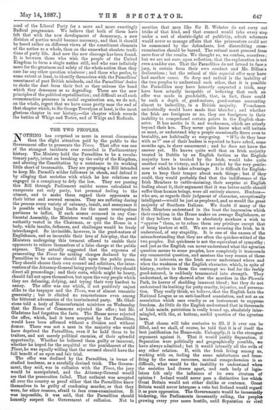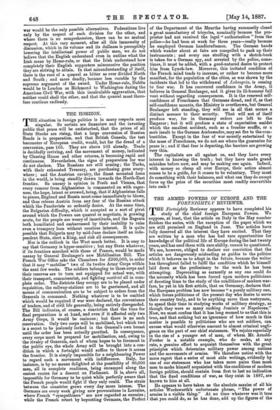THE TWO PEOPLES.
NOTHING has surprised us more in recent discussions than the slight attention paid by the public to the Government offer to prosecute the Times. That offer was one of the strangest incidents ever recorded in Parliamentary history. The Ministry hold the Parnellites to be a revolu- tionary party, intent on breaking up the unity of the Kingdom, and altering the Constitution by a resistance to its working little short of treasonable. They are proposing a Bill intended to keep Mr. Parnell's wilder followers in check, and defend it by alleging that societies with which he has relations are engaged in a conspiracy to defy the law. They are passing this Bill through Parliament amidst scenes calculated to exasperate not only party, but personal feeling to the utmost, and to make them regard their opponents as their bitter and avowed enemies. They are suffering during the process every variety of calumny, insult, and annoyance it is possible within legal limits for the most unscrupulous partisans to inflict. If such scenes occurred in any Con- tinental Assembly, the Ministers would appeal to the penal authority vested in the Chairman, or quit the House in a body, while insults, defiance's, and challenges would be freely interchanged. So invincible, however, is the good-nature of Englishmen, and so incurable their love of fair-play, that the Ministers undergoing this torment offered to enable their opponents to relieve themselves of a false charge at the public expense. They actually suggested that the expenses of prosecuting the Times for making charges declared by the Parnellites to be untrue should fall upon the public purse. They should choose their own counsel and solicitors, the inter- vention of the Attorney-General being purely formal; they should direct all proceedings ; and their costs, which might be heavy, should fall not upon themselves, but upon the very people which they are defaming, defying, and trying their very hardest to annoy. The offer was one which, if not positively unjust alike to the taxpayer and the Mass, was of almost romantic generosity ; but it elicited no remonstrance even among the bitterest adversaries of the incriminated party. Mr. Glad- stone told a body of Nonconformist ministers on Wednesday that the House of Commons rejected the offer; but Mr. Gladstone had forgotten the facts. The House never rejected the offer, which, had it been accepted by the Pamellites, would have been affirmed without a division and without demur. There was not a man in the majority who would have deprived the Parnellites, even if he held them to be traitors, and not merely political enemies, of their splendid opportunity. Whether he believed them guilty or innocent, whether he hoped for the acquittal or the punishment of the Times, he was equally willing that the accused should have the full benefit of an open and fair trial.
The offer was declined by the Parnellitee, in terms of studied insolence, as a carefully devised trick. The Govern- ment, they said, was in collusion with the Times, the jury would be manipulated, and the Attorney-General would see that the prosecution failed. That outburst was accepted all over the country as proof either that the Pamellites knew themselves to be guilty of condoning murder, or that they were, for other reasons, afraid to face cross-examination. It was impossible, it was said, that the Parnellites should honestly suspect the Government of collusion. Not to mention that men like Sir R. Webster do not carry out tricks of that kind, and that counsel would take every step under a sort of electric-light of publicity, adroit schemers would never so manage affairs that the prosecutors could not be summoned by the defendants, lest discrediting cross- examination should be barred. The refusal must proceed from mere fear of the results. We thought so, we confess, ourselves ; but we are not sure, upon reflection, that the explanation is not even a sadder one. That the Parnellites do not intend to face a jury, is certain from their own conduct and Mr. Dillon's declarations ; but the refusal of this especial offer may have had another cause. So deep and radical is the inability of the two peoples to understand each other, that it is possible the Parnellites may have honestly suspected a trick, may have been actually incapable of believing that each an offer was made in good-faith, that, in fact, there could be such a depth of, good-nature, good-nature amounting almost to imbecility, in a British majority. Frenchmen undoubtedly would have made that blunder ; and whether the Irish are foreigners or no. they are foreigners in their inability to comprehend certain points in the English char- acter. It has merits in it, and weaknesses, which are utterly beyond their ken. They never quite know what will irritate us moat, or understand why a people occasionally fierce even to brutality, are habitually so easy-going. "Why do they bear with us I" one of their leaders is reported to have asked, some months ago, in sheer amazement ; and be does not know the answer yet. He knows quite well that an Irish majority treated in Dublin by an English faction as the Englishn majority here is treated by the Irish, would take quite
another road to victory, and he is puzzled by the very gentle- ness of which he takes advantage. It is difficult for English-
men to keep their temper about such things ; but if they could, they would probably find that the indifference of the Irish Members to cattle-maiming, their surprise at English feeling about it, their argument that it was better cattle should suffer than human beings, were all entirely sincere. Hindoos- who are, as regards their judgment of character, exceptionally intelligent—would be just as perplexed, and so would the great majority of Southern Italians. We doubt if many of the Irish Members understand in the least the impression which their rowdyism in the House makes on average Englishmen, or if they believe that there is absolutely nowhere a wish to " oppress " them, or to refuse them any privilege except that of being lawless at will. We are not accusing the Irish, be it understood, of any stupidity. It is one of the causes of the misunderstanding that they are often the quicker-witted of the two peoples. But quickness is not the equivalent of sympathy ; and just as the English can never understand what the agrarian question means to some peoples, how completely it transcends any commercial question, and masters the very reason of those whom it interests, so the Irish never understand where and when the weakness of the English character, which, in spite of history, excites in them the contempt we feel for the feebly good-natured, is suddenly transmuted into strength. They understand, as they showed after the murders in the Phoenix Park, its horror of shedding innocent blood ; but they do not understand its loathing for petty cruelty, injustice, and persecu- tion. They really think, we believe, that the English hate the National League as an anti-landlord association, and not as an association which uses cruelty as an instrument to suppress freedom. As little do the English understand that in thousands- of Irish minds, patriotism is really bound up, absolutely inter- mingled, with the, at bottom, sordid question of the agrarian laws.
That chasm will take centuries to fill, if it ever can be filled, and we shall, of course, be told that it is of itself the best justification for Home-rule. Unhappily, it is the strongest argument against it. That it would justify Separation, if Separation were politically and geographically possible, we have always admitted ; but it would intensify all the evils of any other relation. If, with the Irish living among us, working with us, feeling the same misfortunes and bene- fiting by the same successes, mutual comprehension is so difficult, what would be the inability to understand when the societies had drawn apart, and each body of legis- lators felt only the influence of its own stratum of opinion I Ireland would never pass a distinctive law which Great Britain would not either dislike or contemn. Great Britain would never interpose a veto but Ireland would regard it as pure oppression. The Governments would be incessantly bickering, the Parliaments incessantly railing, the peoples growing every year more hostile, until Separation or civil
war would be the only possible alternatives. Federations live only by the respect of each division for the other, and where there is no comprehension, there can be no mutual respect. At this very moment, after all this immensity of discussion, which in its volume and its dullness is perceptibly lowering the intellectual power of public men, we do not believe that the English understand even in outline what the Irish mean by Home-rule, or that the Irish understand how completely their English supporters misconceive the position they are striving to attain. In that misunderstanding of itself, there is the root of a quarrel as bitter as ever divided North and South ; and more deadly, because less curable by the supreme argument of the sword. Under Home-rule, Dublin would be to London as Richmond to Washington during the American Civil War, with this incalculable aggravation, that neither could shell the other, and that the quarrel must there- fore continue endlessly.



































 Previous page
Previous page